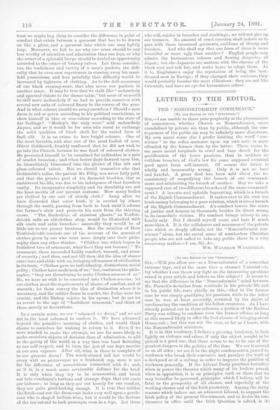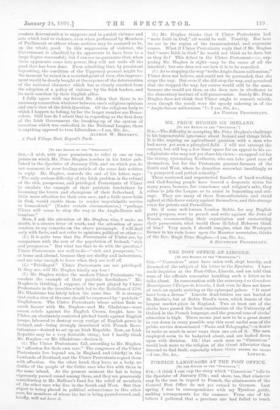[To THE IEDITOR OF THE " SPECTATOR." J SIR, — Will you
allow me—as a Nonconformist of a somewhat extreme type, and at the same time a staunch Unionist—to try whether I can throw any light on the interesting questiona raised in your article and letters on this subject? It seems to me that the difference in the " Nonconformist " mind between. Mr. Parnell's deviation from rectitude in his private life and in his public life, rests chiefly on this,—that in the former case he was .simply gratifying his passions, while in the latter case he was, at least avowedly, actuated by the desire of ameliorating the condition of his fellow-creatures. As I have already pointed out in these columns, a portion of the Radical Party was willing to condone even the former offence as long as this seemed likely to offer the hest chance of bringing about Home-rule ; but this was not the case, as far as I know, with the Nonconformist ministers.
It is in this tendency, I believe a growing tendency, to look lightly on violence and crime, if only the object sought to be gained is a good one, that there seems to me to lie one of the' greatest dangers in the politics of the time. We see it around us on all sides ; we see it in the slight condemnation passed on workmen who break their contracts and paralyse the work of a dockyard or of a railway in order to improve the position of workmen generally. If the Liberal Party practises hereafter when in power the theories which many of its leaders preach when in opposition, it is on principles such as these that we may hereafter be governed, principles which I believe will be fatal to the prosperity of all classes, and especially of tile working classes and of the Irish peasantry. Among the many reasons which induce me, an advanced Liberal, to support the Irish policy of the present Government, and to desire its con- tinuance in office until the Irish Question is solved, is its resolute determinaticn to suppress and to punish vio7ence and acts which lead to violence, even when performed by Members of Parliament or others whose motives may be assumed to be, on the whole, good. In this suppression of violence, the Government is admitted by its opponents to have been to a large degree successful ; but I can see no guarantee that, when these opponents come into power, they will not undo all the 'good that has been done. Even admitting that, by persistent boycotting, the condition of the Tipperary peasant might for the moment be raised in a material point of view, this improve- ment would be dearly bought at the expense of the deterioration of the national character which has so clearly resulted from the adoption of a policy of violence by the Irish leaders, and its tacit sanction by their English allies.
I fully agree with my friend Dr. Allon that there is no necessary connection whatever between one's religious opinions and one's view of the Irish Question. Of the religious body to which I happen to belong, by far the larger number are Home- rulers. Still less do I admit that in regarding as the first duty of the Irish Government the breaking-up of the system of terrorism which was embodied in the National League, there is anything opposed to true Liberalism.—I am, Sir, &c.,
ALFRED W. BENNETT,
6 Park Village East, Regent's Park.







































 Previous page
Previous page